A CULTURE OF COMPASSION
UW alumni and pharmacists adapt, inspire and innovate in an era of uncertainty.
Fall 2020
PAYING IT FORWARD
Beth Devine honors her past by paving the way for a new generation of women scientists in STEM with The Devine Family Endowed Fellowship.
For Beth Devine (‘01), Professor and Graduate Program Director for The CHOICE Institute, the inspiration for helping young women shoulder the financial burden of pursuing a career in health economics and outcomes research comes from a very personal place.
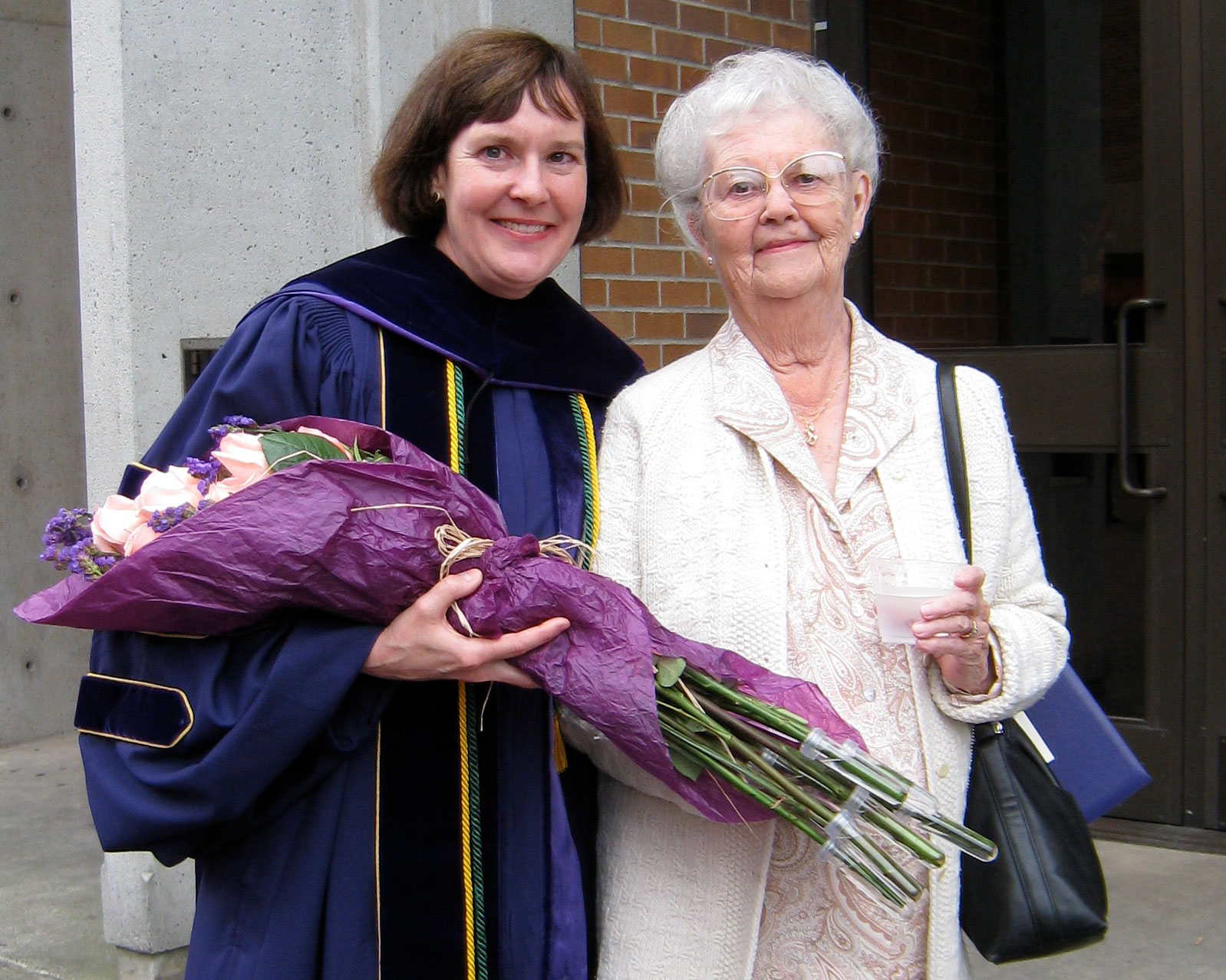
“I have always dreamed of being able to inspire women to become future leaders in STEM fields,” she said, “while, at the same time, wishing to honor my mother and father for helping me to achieve my goal of becoming a health economics and outcomes research scientist in academia.”
Beth’s dream came to fruition recently, with her establishment of the Devine Family Endowed Fellowship for Graduate Students, created to recognize and support women in STEM who are studying Health Economics and Outcomes Research within The CHOICE Institute. For years, women have been under-represented in STEM and in STEM leadership positions in most sectors of the economy – technology, natural sciences, life sciences, economics, and (bio)statistics, to name a few. Beth is determined to contribute to changing that narrative, and this fellowship brings that change closer to reality. “Women scientists in these disciplines face unique challenges and hurdles as professionals in both business and academic settings,” she noted. “Each of us stands on the shoulders of those who have come before us, and as a result, things get easier year over year.” Even so, Beth acknowledges that disparities remain.
As an example, during this era of COVID-19, the bulk of childcare responsibilities seem to be falling disproportionately to women, who are now sometimes pausing their professional lives to a greater extent than men. “This is where extra funding can make a critical difference and impact,” she said. “An extra boost is always welcome – be it an unexpected and exciting opportunity, a new network connection, or a bit of extra financial support.”
Beth knows well the need for all of us to lend – and embrace – these opportunities as they come along, and how important connections are to growing both personally and professionally. “I have benefitted from many of these boosts throughout my professional life,” she said, “and I wish to smooth the path forward for others.”
SEEDS OF INSPIRATION
Beth’s ongoing efforts to serve as a role model for women are rooted in her own DNA.
If you trace the roots in Beth Devine’s family tree, it’s easy to see from where her devotion to educational equality derives.
“My mother, Emily Davies Devine, was the first in her family to graduate from college,” she said. “And that was at a time when approximately 8% of U.S. women graduated from college. Teaching high school history and English at a petite 80 pounds and 5 feet 2 inches, her male students towered over her, but knew well ‘not to mess with Miss Davies’. She was a diminutive powerhouse.”
A generation earlier, at the beginning of the Great Depression (1930) and in an era when jobs were saved for men, after losing her husband to cancer at a young age, Beth’s grandmother raised four children alone, taking in washing and boarders to keep her family together and in their own home. A generation before that (1893), under almost exactly the same circumstances, Beth’s great-grandmother was called to do the same thing. This singular devotion to family and forging a future with hope on the horizon is something Beth carries with her to this day.
“I have had three very bright, strong and courageous women role models in the three successive generations before me,” Beth said. “And contributing his own professional and leadership qualities, my father provided yet another exemplary role model. Earning a professional education was an expectation with which my sisters and I grew up. My sisters and their families have always been supportive of me, continue to add variety to, and enrich my life is countless ways. I am lucky, indeed, and am delighted to have this opportunity to pay it forward.”
RISING TO THE CHALLENGE
Though the COVID-19 pandemic has hit rural areas particularly hard, pharmacies serving these communities have risen to meet an array of challenges with innovative solutions.
According to Don Downing, UWSOP clinical professor, the COVID-19 crisis has ushered in a multitude of challenges for rural pharmacies, from shouldering the financial burden of a crippled economy to taking on a more involved, hands-on role with patients. “Rural pharmacies are under tremendous financial pressure due to significant reductions in compensation for filling prescriptions,” he said. “During the pandemic, many patients have not been seeing their medical providers for their existing chronic medical conditions, so pharmacists are challenged with making sure their patients stay on their medications.”
EMERGING ISSUES
Kirk and Andrew Heinz (‘13), father & son owners and operators of Kirk’s Pharmacy in Eatonville, WA, can attest to those challenges, in addition to a host of other pandemic-driven hurdles. “By far, one of the biggest issues has been knowing or getting accurate and current information regarding COVID-19,” Kirk noted. “As pharmacists, we are always one of the first health care providers that people turn to for questions and information about this kind of issue. It has almost been like a second job trying to keep as up to date as possible with COVID-19 and the pandemic.”
“Taking care of business has always been our primary focus”
-Kirk Heinz
For Rick McCoy, owner of Lopez Island Pharmacy, the logistical challenges associated with being the island’s only pharmacy have been overwhelming. In March, his business switched to curbside services only, and having a limited staff has created a daily race against the clock. “Simply filling prescriptions and taking them outside to the patient’s car is easy, but one of the first things we found out was how much more additional time it takes,” he said. “Our policy is that on all new prescriptions, the patient must meet with the pharmacist to go over their new medication. As a result, orders began to back up and with each passing day we were getting further and further behind.”
SUCCESS STORIES
To accommodate escalating demand for appointments, Rick and his team developed an online system that has proven to be a success. “In the past, patients would call or stop in to make an appointment,” he said. “Now, almost all our new patient intake forms and vaccination questionnaires are online and interactive. It keeps us off the phones and is easy for the patients to use. So far, it’s working out great.”
Kirk and Andrew have also made strides to evolve and adapt to this new era of needs, including tailoring services for high risk patients. “When we transitioned to closed door, I feel the move to curbside pick-up went very well, and to this date we have some of our more concerned high-risk patients still using the service,” said Andrew. “Our front-end clerks doubled as personal shoppers and would gather needed OTC, vitamins and supplements for patients to bring to them.”
Simeon Roth (‘17), owner of Invara Pharmacy & Clinic in Sultan, WA, was able to assist and accommodate a homebound patient who couldn’t access his normal pharmacy. “He called us for help and we were able to get his medication within a few hours of contacting us,” Simeon revealed. “This patient had never filled with our pharmacy until he called us.”
For Kirk Heinz, this growing list of examples chronicling the dedication of fellow pharmacists to endure and succeed during this trying time comes as no surprise.
“What has always made independent pharmacies strong and successful is our ability to adapt,” he said. “Taking care of our communities has always been our primary focus.”
A PIONEERING SPIRIT
2020 PhD graduate Michelle Redhair’s heritage inspired her passion for pharmacy and helped forge her path toward a career in research.
For any student, a successful thesis defense is a special and anticipated occasion – a culmination of years of hard work, sacrifice and dedication. But for Michelle Redhair, who finished her graduate work this year in Bill Atkins’ lab and over the summer received her PhD from the School, the event represented something far more personal and profound. Michelle, a member of the Navajo Nation and native of the Navajo Reservation, is the first Indigenous Native American to receive a PhD from the School.
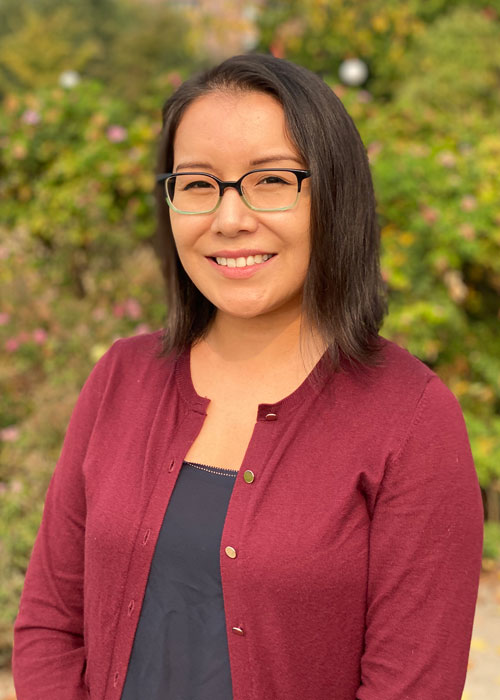 Michelle says her career aspirations were formed early on, growing up in a region and culture with inadequate access to the many health care resources most of us take for granted.
Michelle says her career aspirations were formed early on, growing up in a region and culture with inadequate access to the many health care resources most of us take for granted.
“I felt a drive from a young age to pursue a health-related career, which was also the dream my grandma had for me,” she recalls. “The Navajo culture is matrilineal, so the opinions of the women in my family, especially my grandma’s, were very important to me.”
Though she initially had planned to enter the field as a physician as an undergrad, encouragement from a colleague at the University of Arizona inspired her to apply her talents at one of the university’s research labs. It was there she found her true passion in research. Having been drawn to UWSOP’s Medicinal Chemistry in her final summer as a MARC trainee, Michelle found the school to be an ideal fit for her interests and talents.
“I applied to PSSDP (Pharmacological Science Summer Diversity Program) at UW and was able to spend a summer working as a visiting undergraduate in Kelly Lee’s lab studying viral capsids,” she said. “The high-quality research and the friendly faculty and students I encountered solidified my desire to apply for the graduate program the following year.”
Based on her positive experience working as an intern at Seattle Genetics, Michelle hopes to continue a career in research in an industry setting. “To me, one of the most rewarding aspects of my work has been witnessing my trainees have their own success, by passing on the ‘lab hacks’ that I taught them – or maybe even improving them,” said Michelle. “Many people have helped me get to where I am today, and I love being able to pay forward all the guidance I received from my own mentors.”
ORIGIN STORY
A PROPER INTRODUCTION:
“A traditional Navajo introduction includes your clans,” said Michelle. “For instance, I am of the Sleepy Rock People Clan (Tsé Nahabiłnii), born from the Bitter Water Clan (Tódích’íi’nii). The Near the Water Clan (Tábąąhá) are my maternal grandfather’s clan and the Yucca of the Fruit Line Clan (Hashk’ąą Hadzohí) are my paternal grandfather’s clan.”
Though Michelle’s family moved away from the Navajo Nation reservation when she was 3 years old, the culture’s rich, vibrant heritage was never too far away, as she spent many summers growing up visiting her relatives.
“We herded sheep and cows, and visited with my grandparents and the rest of my family on the reservation,” she said. “I’m grateful to have had that time with my family. Those experiences continue to inform and inspire me every day.”
A FAMILY AFFAIR
Andrew Heinz brings a deep-rooted history in pharmacy education and practice to his new role as chair of the PAA’s Membership Committee.
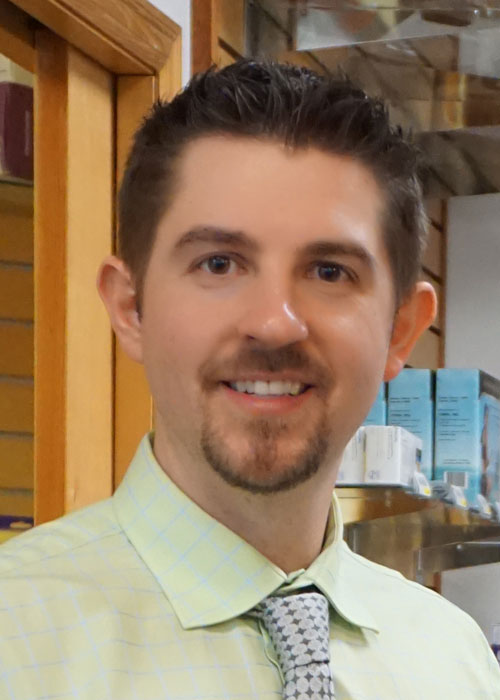 Though Andrew Heinz (’13) was welcomed this year as the newest member the PAA Board, his relationship roots with the pharmacy field are deeper than most.
Though Andrew Heinz (’13) was welcomed this year as the newest member the PAA Board, his relationship roots with the pharmacy field are deeper than most.
An Eatonville, Washington native and second-generation pharmacist, Andrew was 5 years old when his dad purchased an independent pharmacy in his hometown. During his pre-teen tenure working at the store, he rose in the ranks from breaking down boxes and taking out trash to moving to the front-end of the establishment to help run the cash register. By his senior year, Andrew was working side-by-side with his dad.
“This is when I really got to see the impact a pharmacist can have on a patient’s life, and the importance they play in their community,” he recalls.
With experience already under his belt, and the groundwork for his future career firmly cemented, Andrew had UWSOP in his sights at an early age.
“Since middle school I’d known my educational destination was going to be UW, and that I wanted to eventually pursue a post-grad education in pharmacy,” he said. “Call it confidence – or hubris – but I only applied to UW and UWSOP. Thankfully, I was accepted to both.”
“The most rewarding aspect of my job is seeing the impact I can have on someone’s life.”
-Andrew Heinz
A practicing pharmacist for the last 7 years at Kirk’s Pharmacy in Eatonville, Andrew still works side-by-side with his dad and says the rewards of his chosen profession are manyfold.
“As I learned from watching my dad when I worked with him at an early age, the most rewarding aspect of my job is seeing the impact I can have on someone’s life,” he says. “Being able to help someone navigate their health and better understand what they can do to become healthier and have an improved quality of life is an amazing feeling.”
As newly-appointed chair for the PAA Board’s Membership Committee, Andrew is excited about working with his fellow committee members and the UWSOP staff to help increase PAA membership numbers.
“This is a very trying time for all of us, but especially for students,” he said. “They need our support more than ever, and I feel the PAA will continue providing valuable services for our students and championing their talent.”
THE ARTISTRY OF COMPASSION
Through her work, educator, artist and UWSOP alumna Kathy Moscou illustrates the meaningful connection between science and art.
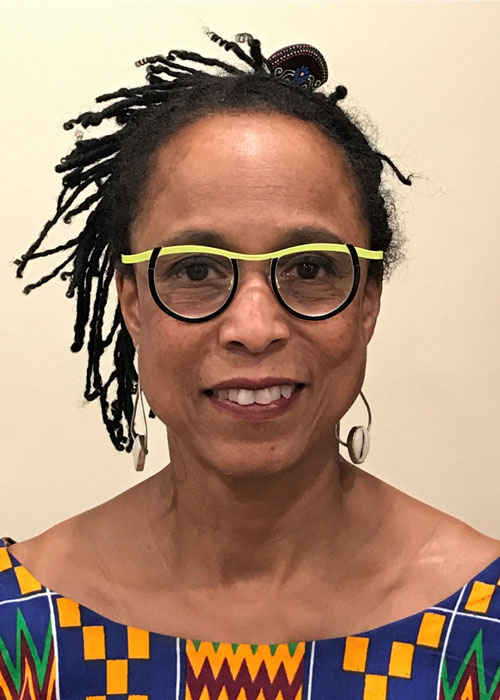 With a PhD in Pharmaceutical Sciences, a Master’s in Public Health and Bachelor of Science in Pharmacy, Kathy Moscou (’77) has devoted a life to service in the pharmacy field. And even though she continues that legacy in the classroom as an assistant professor at OCAD University in Toronto, Canada, the New York City native has discovered an alternate avenue to express her professional and cultural journey – as an artist.
With a PhD in Pharmaceutical Sciences, a Master’s in Public Health and Bachelor of Science in Pharmacy, Kathy Moscou (’77) has devoted a life to service in the pharmacy field. And even though she continues that legacy in the classroom as an assistant professor at OCAD University in Toronto, Canada, the New York City native has discovered an alternate avenue to express her professional and cultural journey – as an artist.
This transition from the research lab to the the paint-splattered palette isn’t exactly a new development for Kathy, who, from an early age, knew art would play an important role in her life.
“At six years old I attended free art classes at the housing center in the New York City project where I grew up,” she recalled. “Later, I studied art at the prestigious High School of Music and Art in New York City, later to be joined with High School of Performing Arts – made famous in the movie Fame. Growing up in NYC provided me access to numerous art galleries and museums from which I nourished my interests in art.”
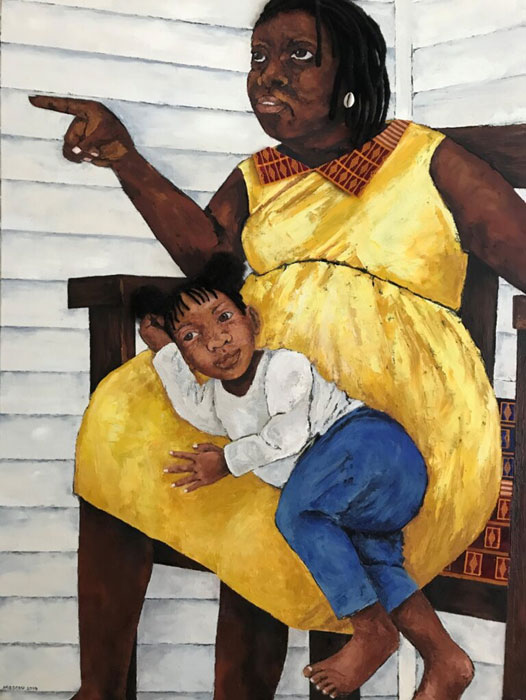
For Kathy, the connection between her dual careers as a pharmacist and artist is clear, and her experiences in the pharmacy field as both a researcher and an educator continue to inform her artwork, particularly in regards to such social issues as socio-economic inequality and health disparity. In the rich, bold colors and textures of her work, she explores such contemporary issues as HIV/AIDS and the COVID-19 pandemic.
“I am a visual storyteller communicating with my viewers, and this conception of art has been shaped by my role as a pharmacist – specifically my experience as a patient advocate in community practice,” she revealed.
With her mixed-media use of beads, sand, fabric, shells and other objects to contextualize her work, Kathy’s aesthetic is striking and singular – but she insists the ultimate purpose of her creations is to both move your heart and make you think.
“Art can both inform and lead to reform,” she says. “I view my art as visual commentary to motivate social change, and I hope that viewers of my body of work will think critically about contemporary issues such as health disparities, Black Lives Matter, and Missing and Murdered Indigenous Women and Girls, and find hope in their power to create a more just world in the beauty of the nurturing relationships exhibited in my paintings.”
Learn more about Kathy and her work: moscouart.com
MASS APPEAL
Sabra Zaraa, PharmD, MPH recounts a life-changing experience working in Saudi Arabia.
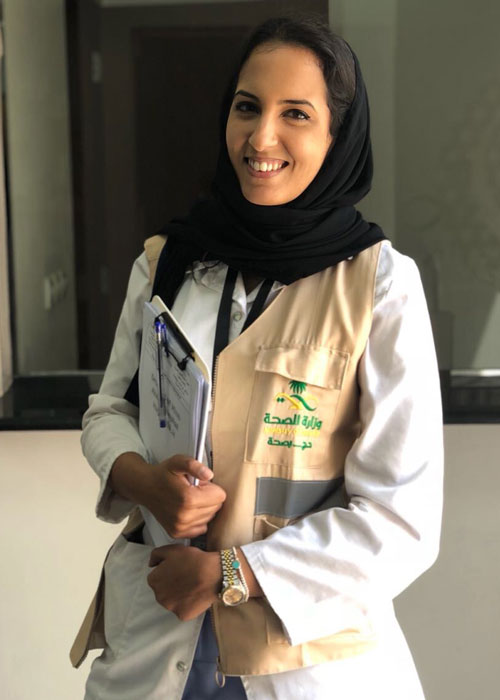
After being awarded the Stergachis Endowed Fellowship in 2018, Sabra Zaraa, a third-year PhD student with The CHOICE Institute, was ready to tackle something ambitious for her next project, so she set her sights on the town of Makkah, Saudi Arabia, and committed two months of her life to investigate drug utilization patterns among outpatients at hospitals.
Sabra’s arrival coincided with the beginning of preparation of the Hajj, a holy event that draws more than 2 million Muslim pilgrims every year. For someone interested in studying the correlation between mass gatherings and public health patterns, this was akin to a football fan getting a front row seat at the Super Bowl.
“It’s an event that millions of Muslims dream of attending, but it also represents enormous organizational challenges, including the provision of medical and public health care,” she recalled. “My focus was to help assess pilgrims’ drug utilization patterns so organizations that host the event can be better prepared to align patients’ needs with adequate and appropriate medicine supplies.”
Sabra, a native of Tunisia, North Africa, says the experience was something she had long worked toward and prepared for, as she had been extensively studying mass gatherings and public health activities for over a year with her mentor, Andy Stergachis.
But even she admits, the sheer scale of the annual event was often overwhelming. “It was a completely different setting than I could have ever anticipated,” she said. “Millions of people filled the streets of Makkah, and some work days ended as late as 1 a.m. – with temperatures climbing as high as 113F. Thankfully, growing up in the Mediterranean prepared me to cope with the heat.”
The experience provided Sabra with an opportunity to evolve from trainee to trainer and apply the skills she honed as a clinical pharmacist, a global health student and a mixed-methods researcher.
“This project showed me how rewarding it can be to translate scientific knowledge into innovative solutions.”
– Sabra Zaraa
Though Andy – who had served as director for the WHO Collaborating Center on Mass Gatherings and Public Health from 2014-18 – was well aware of the considerable task ahead for Sabra, he was also confident his mentee was more than qualified for the opportunity.
“Over a brief, intensive period of time, Sabra completed a high-quality study of drug utilization that is beneficial for planning future Hajj,” he said. “JoAnn and I are pleased that the fellowship we established has supported numerous graduate and professional degree students like Sabra to engage in worthwhile health-related learning activities in low-income countries.”
Sabra noted that the Saudi-based Global Center for Mass Gatherings Medicine offered strong organizational support throughout the duration of her project, including housing and institutional support during the Hajj deployment in Makkah.
“While I was there to conduct my medication utilization study, I also had the opportunity to support other ongoing projects and collaborate in other studies,” she said. “I am now committed more than ever to generate actionable evidence to overcome contemporary problems in population health challenges through research globally. This project showed me how rewarding it can be to translate scientific knowledge into innovative solutions.”
NEW HSEB SLATED FOR 2022
The new $100M+ Health Sciences Education Building is scheduled to debut in 2022.
The new $100M+ Health Sciences Education Building is scheduled to debut in 2022. Once completed, the building will be shared among the UW’s six health sciences schools and is expected to catapult those programs to the forefront of interprofessional education.
BOUNDLESS SUCCESS
A look inside the UW’s historic 10-year philanthropic campaign, Be Boundless – for Washington, For the World.
Originally published Fall 2020